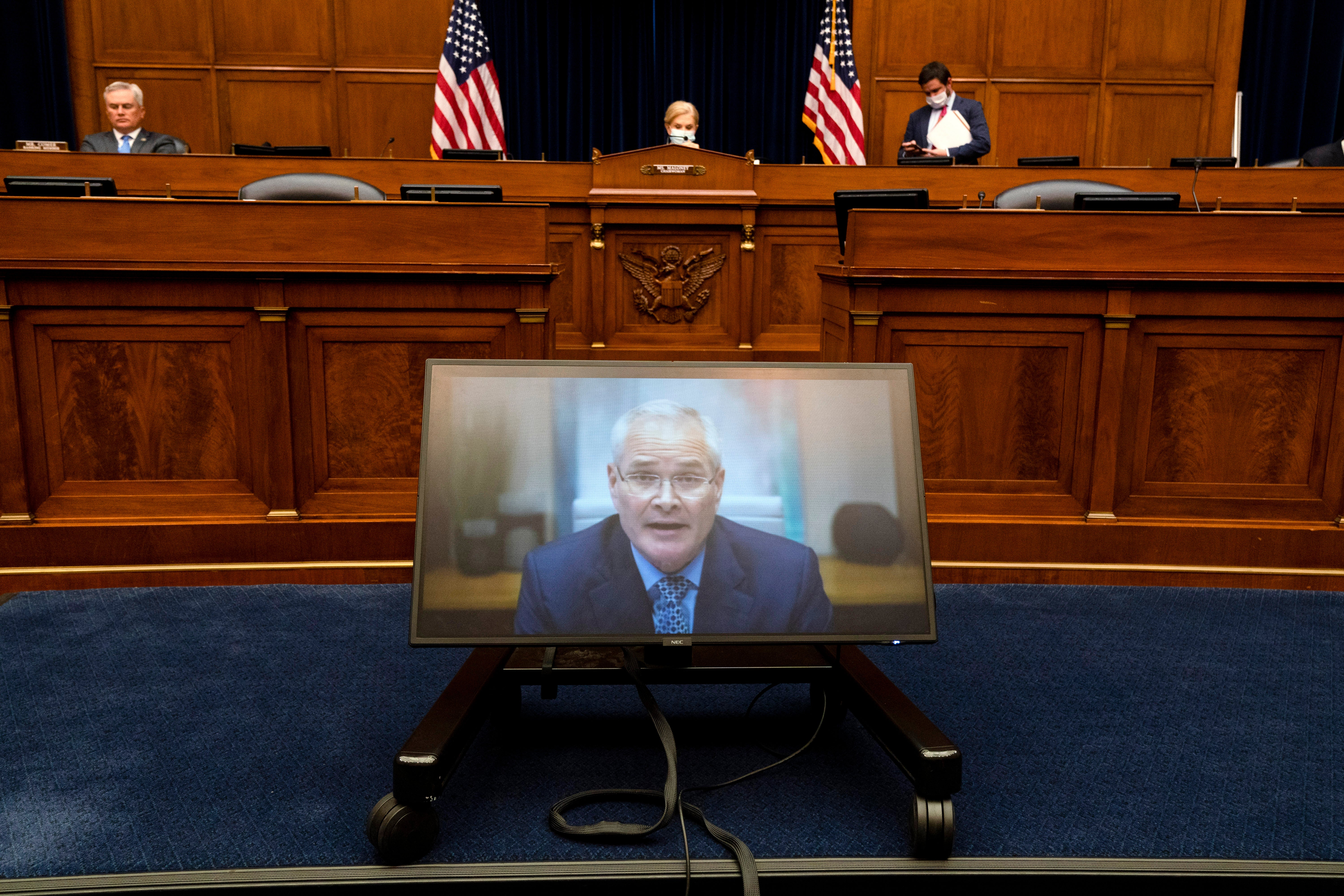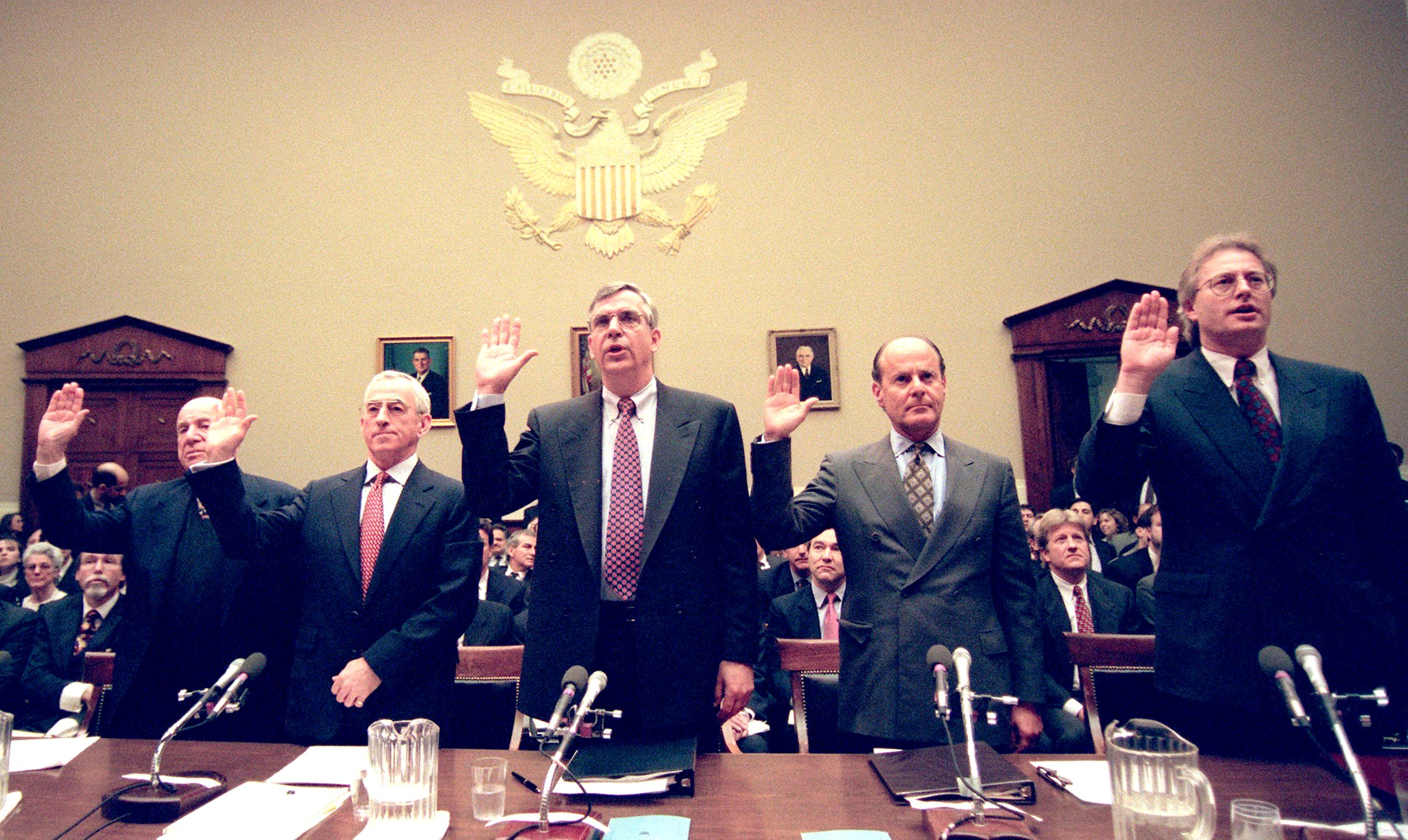The congressman taking on Big Oil’s climate disinformation
Ro Khanna, who is leading the Democratic effort to take on the fossil fuel industry, speaks to The Independent about his takeaways from Thursday’s hearing
Ro Khanna, the congressman spearheading efforts to hold Big Oil accountable for its outsized role in causing the climate crisis, has told The Independent that he and his Democratic colleagues were left with no choice but to issue subpoenas for internal documents as it was “justified by their record”.
“They thought they would just sit there, survive this and then move on with their lives. And that’s not going to happen,” Mr Khanna said.
His remarks came after leaders of the US’s four largest oil companies – Exxon Mobil, Chevron, BP and Shell – were questioned under oath for the first time over accusations they had engaged in a decades-long campaign to contradict and obfuscate the scientific consensus that their products were driving global heating.
Democratic members also pressed executives, joined by the president of the industry’s lobbying outfit, American Petroleum Institute (API) and the head of the US Chamber of Commerce, on continued efforts to stymie policies for reducing emissions which are driving an ever-worsening cycle of hurricanes, wildfires, heatwaves and drought across the US and globally.
At Thursday’s hearing, the oil industry chiefs stuck to carefully crafted talking points and issued denial after denial to the allegations that the industry had concealed evidence – which they were first made aware of in the Seventies – that burning fossil fuels was driving up global temperatures.
ExxonMobil CEO Darren Woods testified that his company “has long acknowledged the reality and risks of climate change, and it has devoted significant resources to addressing those risks”.
But he added that Exxon’s public statements on climate “are and have always been truthful, fact-based... and consistent” with mainstream climate science.
After the hearing, Mr Khanna said he was disappointed by the responses but also struck by how “loyal” current executives were to their company’s past mistakes, and former executives’ words.

In 2002, Exxon’s then-CEO Lee Raymond had denied a link between fossil fuel combustion and climate change. Mr Khanna, chair of an environmental subcommittee, repeatedly asked Mr Woods if he would now clarify that this had been a mistake. Mr Woods refused, repeatedly saying that Exxon had been consistent with the science.
Mr Khanna compared the move to a modern US president defending remarks of former president Andrew Johnson, who opposed political and civil rights for African Americans at the end of the Civil War, or a Republican defending Senator Storm Thurmond, who was vehemently against Civil Rights legislation in the 1960s.
“A Republican senator isn’t going to say, ‘Yes I thought Storm Thurmond’s comments were really thoughtful for their time,’” Mr Khanna said. “Yet Exxon was just unwilling to even say, ‘Yes, some of these statements were outlandish [and] a mistake.’”
The Independent has sought comment from each oil company, along with API and the Chamber of Commerce. ExxonMobil spokesperson, Casey Norton, said that the company had been cooperating with the House committee and provided almost 130,000 pages of documents, including internal emails.
He added that for four decades Exxon has supported “development of climate science in partnership with governments and academic institutions, adding: “That work continues today in an open and transparent way.”
Since 2000, ExxonMobil has invested more than $10bn to research, develop and deploy lower-emission energy solutions, the spokesperson said.

A BP spokesperson highlighted testimony given by David Lawler, chairman and president of BP America, noting that the company had ended exploration in new countries and by 2030 expected to reduce global oil and gas production by 40 per cent, relative to 2019, “on a scale that no other major energy company is planning to do right now.”
“We hope the hearing last week will contribute to a thoughtful discussion about achieving an orderly and predictable lower carbon future while preserving American leadership in energy,” a Chevron spokesperson said.
At the hearing, Mr Khanna also asked oil executives to tell API and fellow lobbyists to stop running ads on social media against proposals such as electric vehicles and a methane tax. Oil companies have publicly stated that they back such emissions-reduction measures.
“You can tell them to knock it off for the sake of the planet,” Mr Khanna told the hearing. “Would any of you take that opportunity to look at API and say, ‘Stop it’?”
His question was met by silence.
“They were unwilling to do that,” he told The Independent, saying he believed the stonewalling was driven by legal advice against making any admissions.
“My sense is they’re in such a bunker mentality because of all the litigation against them. But in the process, they came off as very unreflective, leaving very little confidence that they wanted to turn a page.”
An API spokesperson said the group would “continue to work the committee consistent with our right to associate and engage in free speech to address the challenge of climate change while producing affordable and reliable energy”.
More than 2,000 climate litigation cases have been filed against fossil fuel companies since the millennium. Mr Khanna said the oil CEOs’ remarks made him doubt the industry’s commitments to supporting emissions-reduction proposals.
“I think that they may not want to be lobbying directly against it but are fine with these third-party groups. They’re certainly not willing to use any of their power or leverage to stop that kind of lobbying.”
The hearing comes months after an undercover investigation by Greenpeace caught a senior ExxonMobil lobbyist on tape explaining the company’s tactics to undermine and obstruct legislation to address the climate crisis.
Led by New York Democrat Rep Carolyn B Maloney, some lawmakers on the committee alluded to a 1994 hearing with the heads of Big Tobacco during which they lied to Congress about the health risks from cigarettes, including a bombshell moment when they stated that nicotine was not addictive.
Mr Khanna started the hearing saying he hoped that oil companies’ executives, who were all testifying remotely because of the pandemic, would “not follow the same playbook as Big Tobacco” as it “didn’t turn out too well for them”.
The congressman said the true importance of the hearing would emerge over time, recalling how the tobacco industry’s assertions that nicotine was not addictive had not grabbed headlines in the immediate aftermath.
In a surprise move, Rep Maloney announced at the end of the more than six-hour hearing that she would issue subpoenas for documents earlier requested by the committee.
A memo ahead of Thursday’s hearing noted that “all the fossil fuel entities” have failed to adequately comply with the committee’s request.
“You could see the look of surprise on the executives’ faces even on virtual television,” Mr Khanna said.
He and Rep. Maloney had decided towards the end of the hearing to issue subpoenas, calling the move “consequential”.
“The [oil companies] have not admitted past misstatements, that they will stop funding climate denialism, stop funding third party groups. What choice are we left with? It’s a bold step to issue subpoenas on the spot, but it was justified by their record.”
Mr Khanna said Democrats would be requesting documents of conversations between oil company executives’ conversation to discover “if these statements have always been consistent with the science”.
They would also seek internal documents that could illuminate “all the third-party groups that they’re funding”, and look closely at those others who create campaigns around climate disinformation and then disseminate it, such as social media companies and PR agencies.
Mr Khanna also said it was a possibility that the oil executives would be called back again to testify.
Republicans on the committee accused Democrats of “partisan theater for primetime news,” during the hearing as President Joe Biden’s hammered-down spending package to address the climate crisis faces being voted on in Congress this week.
Kentucky Rep James Comer, the top Republican on the oversight panel, called the hearing a “distraction from the crises that the Biden administration’s policies have caused”, including gas prices that have risen by $1 per gallon over this year.
Rep Jim Jordan, another Republican from Ohio, said that the American public should be celebrating the fossil fuel industry. “God bless Chevron,” he added.
Mr Khanna responded to the charge from across the aisle by saying if “you care about gas prices, you need to reduce the demand for gas” and that requires “higher CAFE standards [regulations on how far vehicles must travel on a gallon of fuel] more renewables, more electric vehicles”.
He said that holding the fossil fuel industry publicly accountable was in the interest of Americans, and he hoped it would help illuminate the public’s understanding as it had done with Big Tobacco.
“We have to get the public to understand that oil companies have really prevented climate action by sowing doubt, and in killing a lot of legislative efforts. [Thursday’s] hearing was the start of that. Because even Americans who disagree on climate policy hate being lied to by corporations.
“Secondly, we need to shine the spotlight on funding of third-party groups. The [oil executives] can’t go to their board of directors or shareholders and say, ‘I work for green energy’ and then be linked to these groups that are killing green energy. I think that scrutiny is going to increase a tremendous amount after the hearing.
“Thirdly are the administrative and legislative remedies. Do we refer this to the Federal Trade Commission to investigate truth in advertising; to the SEC to investigate proof in representation to shareholders? Do we pass legislation that requires greater oversight in having one’s lobbying and public expenditures aligned with one’s public statements? These are all things we will look into.”
As the Cop26 climate summit gets under way in Glasgow, Mr Khanna said that it had been important to hold the hearing on the cusp of it as it was “directly relevant to the president’s agenda”, noting that oil firms have funded “advertisements against members of Congress, who are supporting those policies”.
“So you wonder why some of the planning provisions are getting stripped from the president’s plan? You had your answer [on Thursday]. None of the oil executives are willing to tell the lobbying groups to stop. So it’s important to shine the spotlight on the role of money in preventing climate action.
“It’s important for us to understand that we won’t hit the Paris Accords if we don’t start taking action to comply with [what] is required. We’re a long way from that. [The hearing] just showed me that we have a lot of work still to do.”
In his opening remarks on Thursday, Mr Khanna spoke of the climate activists who are on hunger strike outside the White House to demand more urgent action.
“They’re putting their lives on the line because of their convictions. It just gave that sense of greater moral responsibility of what we’re doing. I think of their generation because they’re going to have to deal with the consequences the most.”
He said that he had spoken with the activists and was deeply saddened by how they spoke of being afraid to have children because of the climate crisis.
“As a father the most beautiful privilege in my life has been to have kids,” Rep. Khanna said. “So that really makes me sad, and makes me want to do my small part in in advancing humanity’s efforts to tackle this climate crisis. If that’s someplace where I can leave a positive legacy from my service in Congress, that would have been a worthwhile expenditure of time.”
Join our commenting forum
Join thought-provoking conversations, follow other Independent readers and see their replies
Comments
Bookmark popover
Removed from bookmarks